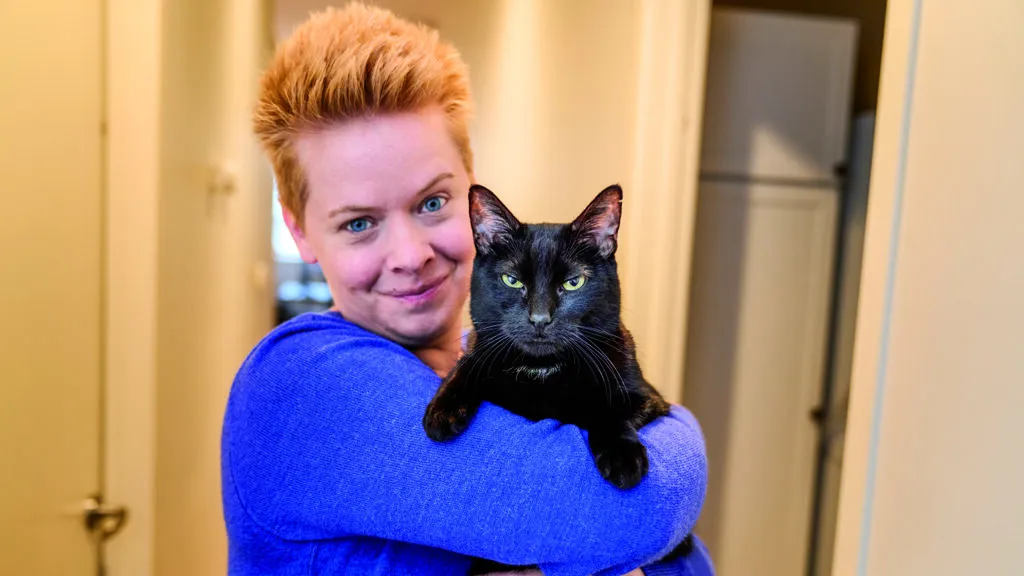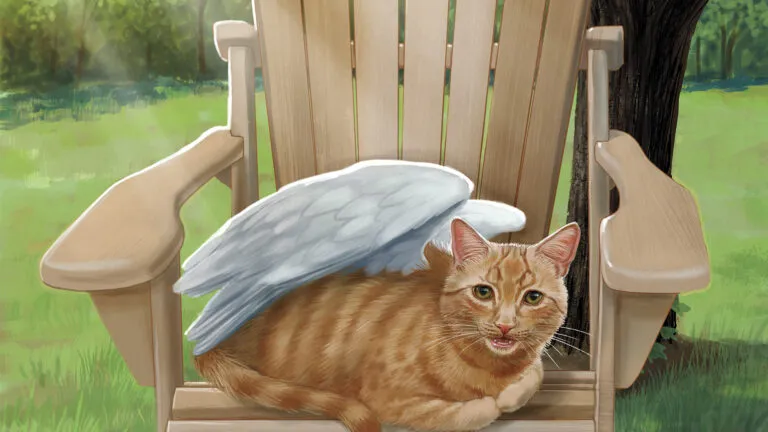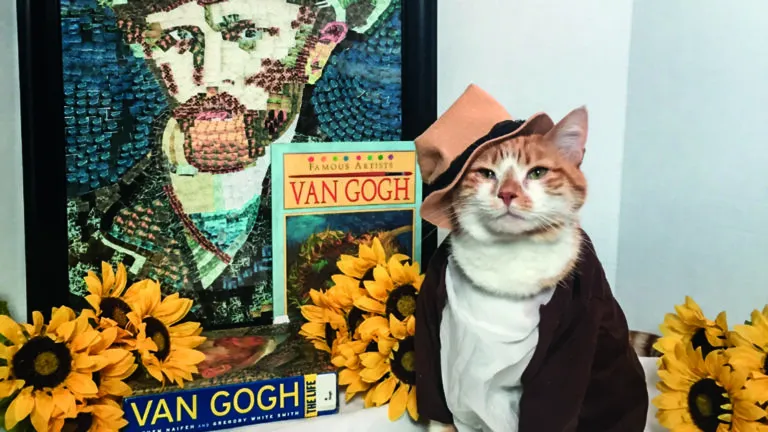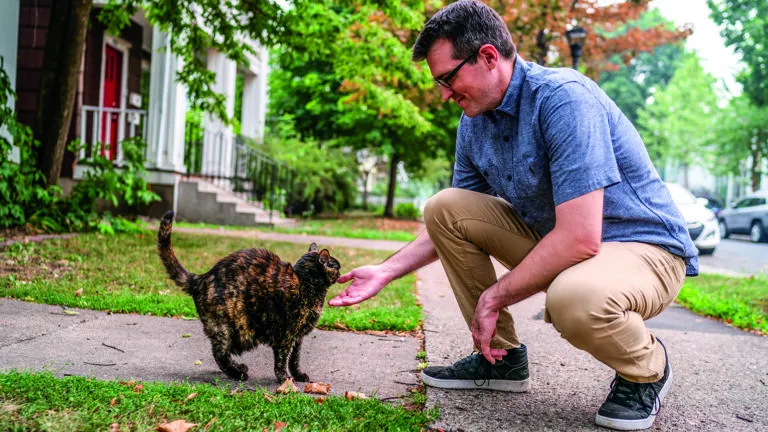‘‘You don’t want that one,” the shelter volunteer said. “He’s broken.”
“Broken?” I asked. Had I heard her correctly? I looked down at the black cat sitting on my foot. He trilled softly. The minute I’d walked into the animal shelter’s cat room, he’d been one step behind me, my shadow. I wasn’t an expert, but this cat seemed friendly.
“He’s been a stray since birth,” the volunteer explained. “He doesn’t like anyone—not other cats, not dogs, not people. Sometimes they’re out there way too long. He’s already three years old. At a certain point, it’s nearly impossible for them to be fully domesticated.”
“I want to adopt him,” I said.
“Really?” she asked. There were several other cats up for adoption, cats that were socialized and would be easier for a first-time owner. “Why?”
“Because he needs a home,” I said. Then under my breath, “And because I’m broken too.”
It was 2017. I’d been in therapy for a while, but it was only recently that my therapist suggested I get an animal companion—preferably something low-maintenance, like a cat. It would be good for me. Maybe even help me form connections with people. I didn’t know if I believed that. But I went to my local shelter.
I don’t know what it was about that little black cat, but I immediately felt a kinship with him. Two abandoned peas in a pod, I guess. I filled out the paperwork and left with him that afternoon.
At home I let him out of the carrier so he could explore. I watched as this little panther smelled every inch of the house. Eventually, his curiosity sated, he settled in my lap. I reached out a hesitant hand to pet him. He purred.
“Look, I’m going to be honest with you,” I said. “I’ve only been able to love two people in my entire life, and I’m thirty-three. I love my brother and one friend—that’s it. I could do without everyone else.” The cat didn’t move. “I have what the professionals call developmental trauma, which causes me to have serious attachment issues.
”Though he wasn’t looking at me, the cat’s ears were pointed in my direction. I knew he was listening. “My mom checked out when I was seven years old—emotionally, I mean. She’s not a bad person,” I said. “She just wasn’t capable of being a mom anymore. Kind of like how your mom wasn’t able to take care of you. I guess you had to figure it out on your own too, huh?”
“Chirp!” the cat replied.
My mom never healed from the trauma she experienced as a child. She went through the motions of parenting, providing shelter and food, but eventually her developmental trauma caught up with her, and she stopped showing me affection, talking to me, encouraging me. Does she love me? I wondered. A lot of times I don’t think she even noticed I was there. She was lost in her own thoughts, her own troubles. My dad, though physically present, was even more absent. I’d accepted his detachment, but I couldn’t let go of wanting a relationship with my mom.
The lack of closeness with my mom affected my interactions with others. I had a couple friends at school, but I didn’t share much of myself with them. What if they decide to shut me out too? I thought.
The cat looked at me. “It’s not like one bad thing happened to me. It’s more about what didn’t happen,” I said. He lowered his head and closed his eyes, his body growing heavy. “I’m telling you this because you shouldn’t expect too much from me. Don’t expect me to love you. I don’t know how.” He drifted off to sleep.

As he adjusted to life with me, he got more talkative. More often than not, I found myself talking back:
“Chirp!”
“Hello, there.”
“Chirp!”
“Yes, I’m home.”
“Chirp. Chirp!”
“I see you’ve moved the kitchen sponge to the living room floor. Hunting?”
“Chirp!”
“It looks dead. Good job.”
By the time a year passed, we’d settled into a routine. When I woke up in the morning, Bo—that’s what I called him for short—would demand that I hold him, so he could rub his face against mine. Then it was breakfast for us both before I headed to work. When I got home in the evenings, Bo would meow until I picked him up. I’d put on music and sway with him in my arms. We danced to the many recordings of “Mr. Bojangles,” his favorite being Sammy Davis Jr.’s rendition. “I knew a man, Bojangles,” I’d sing along, “and he danced for you in worn-out shoes…”
Bo was great company, a good conversationalist and a divine dancer. He’d made my life better. Still, I hesitated to call it love. Just the word itself seemed too big for such a small creature—until the day I came home and collapsed into bed, sobbing.
When you’re recovering from trauma, some days are better than others. That day was one of the worst. Part of me had always held out hope that my mother and I would reconcile. That someday she’d call me and we would talk. But she was already 65 years old. If she hadn’t changed by now, it was unlikely she ever would. A hard truth, one that hit me like a ton of bricks that day. Twenty-seven years after she checked out, I had to face it: My mother was truly gone. Letting go of that hope was devastating.
I felt the bed dip and then the softness of Bo’s fur. He curled up by my head. I shifted to give him more space. But space wasn’t what Bo wanted. He got up and repositioned himself, so his back pressed against my face—a solid and deliberate presence.
He stayed with me the whole night. Eventually, I cried myself to sleep. And, when I woke the next morning, my face puffy, Bo was still beside me, purring gently. In that moment, my heart was so full, I was finally able to say it: “I love you, Bo.”
“Chirp!”
Translation: “I know.”
Love isn’t always easy. I know that better than most. It’s a dance, one that involves give-and-take. Many are taught from a young age. They have people who embrace them, teach them the steps and help them keep the rhythm. Some of us learn this dance later in life when we find the right partners. Others may never learn it. I feel for those people. I thought I was one of them.
Then Mr. Bojangles chose me. He led me out onto the dance floor. He’d been abandoned, but he wasn’t afraid to love and be loved. In time, I danced with new friends and, eventually, a partner who knew when to take things slow. One who I was able to tell “I love you,” because of a little black cat who showed me the meaning of those words.
For more inspiring animal stories, subscribe to All God’s Creatures magazine.





